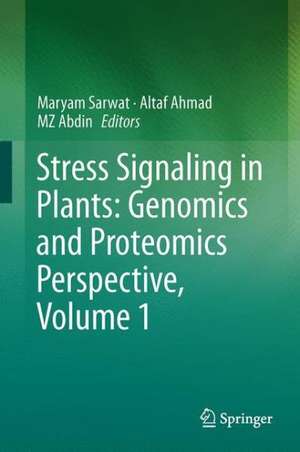Stress Signaling in Plants: Genomics and Proteomics Perspective, Volume 1
Editat de Maryam Sarwat, Altaf Ahmad, MZ Abdinen Limba Engleză Hardback – 20 iun 2013
| Toate formatele și edițiile | Preț | Express |
|---|---|---|
| Paperback (1) | 942.31 lei 6-8 săpt. | |
| Springer – 6 iul 2015 | 942.31 lei 6-8 săpt. | |
| Hardback (1) | 946.72 lei 6-8 săpt. | |
| Springer – 20 iun 2013 | 946.72 lei 6-8 săpt. |
Preț: 946.72 lei
Preț vechi: 1154.54 lei
-18% Nou
Puncte Express: 1420
Preț estimativ în valută:
181.16€ • 193.72$ • 151.04£
181.16€ • 193.72$ • 151.04£
Carte tipărită la comandă
Livrare economică 18 aprilie-02 mai
Preluare comenzi: 021 569.72.76
Specificații
ISBN-13: 9781461463719
ISBN-10: 1461463718
Pagini: 248
Ilustrații: XI, 233 p.
Dimensiuni: 155 x 235 x 18 mm
Greutate: 0.48 kg
Ediția:2013
Editura: Springer
Colecția Springer
Locul publicării:New York, NY, United States
ISBN-10: 1461463718
Pagini: 248
Ilustrații: XI, 233 p.
Dimensiuni: 155 x 235 x 18 mm
Greutate: 0.48 kg
Ediția:2013
Editura: Springer
Colecția Springer
Locul publicării:New York, NY, United States
Public țintă
ResearchCuprins
Preface.- Ca2+, Calmodulin and Plant-Specific Calmodulin-Binding Proteins: Implications in Abiotic Stress Adaptation.- Biotic and Abiotic Stress Signaling in Plants.- Signaling by MicroRNAs in Response to Abiotic Stress.- Signal Transduction and Regulatory Networks in Plant-Pathogen Interaction: A Proteomics Perspective.- Auxin Genes and Auxin Responsive Factors in Signaling During Leaf Senescence.- CBF-Dependent Cold Stress Signaling Relevant Post Translational Modifications.- Regulation and Function of Protein S-Nitrosylation in Plant Stress.- In-silico Approaches for Studying the MAP Kinase Signaling Pathways Involved in Resistance against Alternaria Blight in Brassica.- Plant Cell Signaling in Metal Stress.- Molecular Network of Nitrogen and Sulphur Signaling in Plants.
Textul de pe ultima copertă
The most important prerequisites imperative for survival of human kind food, fodder and fuel depends upon the performance of plants. Due to worldwide temperature inversions, the weather conditions have become completely unpredictable and hostile. Thus, there is a growing need of such plants which are better adapted to these adverse climatic conditions. A good understanding of the signaling mechanism within the plant system during these climatic conditions will certainly going to help in raising plants which are better suited for these adverse conditions.
Stress Signaling in Plants: Genomics and Proteomics Perspective Volume 1 brings together both a Genomics and Proteomics approach to further our understanding in this direction. The volume expands on the current understanding from Bioinformatical approaches to develop the models, as well as proving the ideas up to field conditions. Further, the volume contains comprehensive knowledge of stress signalling useful for graduate students, researchers as well as scientists working in the area.
The ten chapters written by international dignitaries give much weightage to this book.
Stress Signaling in Plants: Genomics and Proteomics Perspective Volume 1 brings together both a Genomics and Proteomics approach to further our understanding in this direction. The volume expands on the current understanding from Bioinformatical approaches to develop the models, as well as proving the ideas up to field conditions. Further, the volume contains comprehensive knowledge of stress signalling useful for graduate students, researchers as well as scientists working in the area.
The ten chapters written by international dignitaries give much weightage to this book.
Caracteristici
Offers a comprehensive understanding of stress signaling in plants Designed to provide an in depth analysis of the subject Premier text for experts working in the field, students, professors and researchers?







